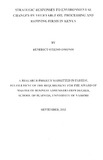| dc.description.abstract | Many organizations are influenced by major changes in their environment, and thus,
those events and developments external to the organizations can affect their ability to
attain the strategic objective as well as strategic choice considered open to the
organization. This study sought to establish the strategic responses to environmental
changes by vegetable oil processing and refining firms in Kenya. To do this, the study
was guided by three objectives: to identify the major environmental challenges
influencing the operations of the vegetable oil processing and refining firms in Kenya; to
establish the strategic responses adopted by vegetable oil processing and refining firms in
Kenya; and to determine the challenges that the vegetable oil processing and refining
firms in Kenya are facing in responding to the environmental changes.
The study adopted cross-sectional survey design with the target population comprising of
all vegetable oil processing and refining firms in Kenya. Since the population was
considered small (35 firms), this study adopted census survey in which 74% response rate
was obtained. The study used primary data collected using a structured questionnaire.
The gathered data was analyzed using both quantitative and qualitative techniques by
application of descriptive statistics.
The study findings revealed that 31% of the organizations studied were refiners while
27% involved in processing whereas 19% of them were involved in both processing and
refining activities this was due to the fact that the major raw material, that is crude palm
oil is mainly imported. The study findings also established that 54% of the vegetable oil
processing and refining firms in Kenya were locally owned while 31% were partly-local
and partly foreign owned. In terms of years of operation, the study findings established
that 62% of these firms had been existence more than 16 years and above as shown in
figure 4.5. Using Likert-scale of 1 to 5 to determine the degree of influence of
environmental changes on these organizations, the study results established that research
and development, E-commerce, internet and E-mail were identified to have high
influence on the organization as indicated by means of 4.000, 4.1429, and 4.000
respectively as shown in table 4.2. On economic changes, the study revealed that inflation
rates, exchange rates and markets trends highly influenced the organization with means
of 4.2857, 4.1429, and 3.5714 respectively. Study findings also indicated that trade
policies and government industrial requirements had moderately influenced
policies and government industrial requirements had moderately influenced these
organizations as shown by means of 3.000 and 2.7143 respectively.
The findings revealed that customer service focus and intensive strategies (e.g. market
penetration, product development) was very highly adopted by organization as strategic
responses with means of 5.0000 and 4.5714 respectively. In addition, the organizations
highly adopted the following strategic responses: restructuring as shown by a mean of
4.2857; technological innovation with a mean of 4.2857; and review of the human
resource policies at a mean of 4.0000.
The study concluded that organizations adopt technological innovation; intensive
strategies to keep pace with the changing environment. Further, the study concluded that
organizations face many challenges including: ability to develop and maintain the cost
leadership process to reduce cost without sacrificing quality; price competitiveness; and
accessibility of financial resources to invest in high efficient production equipments in an
effort to adapt to the strategic responses while responding to environmental changes
The study further recommends that all firm’s business activities should be
technologically driven in order to have a competitive edge which is seen as path to better
results given the quality of processes and procedures that are enhanced by environmental
force. | en |

